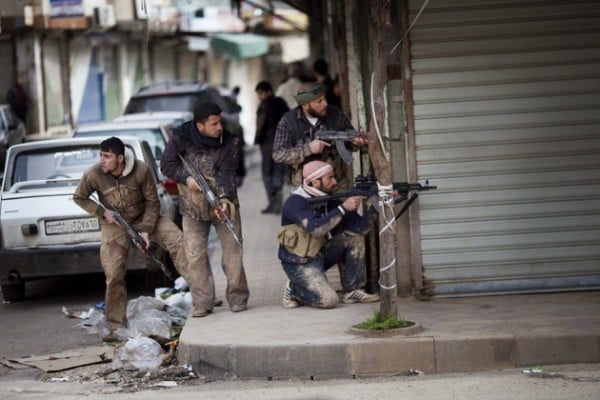
The idea of arming the Syrian rebels is being chatted up once again. The debate will wander and focus in many theoretical directions. Yet essentially the decision will focus on one key pivot: is the goal a short-term or long-term victory?
The safe bet: short-term considerations will win out.
The U.N. proclamation that the one millionth Syrian refugee has crossed an international border adds to the swell of pressure for action. The drumbeat of “desperation” coming from various rebel leaders is increasing, playing on the guilt of some in the west.
So now there is some fudging in public and, no doubt, much nudging out of view.
The U.S. history of giving guns to the guys – a history that must include those times when weapons were NOT given – offers plenty of solid examples and guide points for Secretary of State John Kerry, pro-rebel members of Congress and the Obama administration.
A few cases in point to give a superficial framing to the debate:
In Bosnia, the West stuck to an arms embargo put in place for all of former Yugoslavia. They left the Bosnian Muslims at the mercy of the Serbs, who had the weapons from the Yugoslavia army; the Bosnians’ desperation for assistance then drove them straight into the arms of Muslim extremists who were happy to aid them in all ways possible. Twenty years hence, some of those extremists are still in Bosnia.
In Afghanistan, thanks to Charlie Wilson, the U.S. did supply weapons to the rebels. Then after they beat the Russians, the U.S. disengaged but, of course, did not disarm those guys. Years later, those weapons were used against the U.S. and its allies.
Then there was Libya. No direct weapons supplied but the U.S. winked at smuggling. After that revolution was completed, those weapons bled out of the country — literally – to other parts of north Africa, including Mali, where today they are being used against the French troops and African allies.
So perhaps it is not unfair to ask, does it matter if we give weapons or not in the long term?
Those seeing the positive may embrace the “when” of any weapons delivery as an axiom of the old Fram oil filter commercial. That commercial urged motorists to take action in preventative maintenance sooner as opposed to waiting for the problem to fester. “You can pay me now or pay me later,” that commercial reminded. Point taken from Bosnia.
Yet such a philosophy must be leavened with a reality that in much of the world, the U.S is not liked even if it helps, that supplying weapons may not end a war but help combatants just pause to reload and shift alliances. As Mephistopheles is fond of saying, “You are dammed if you do and dammed if you don’t.”
The table for needing weapons has been poignantly set again and again, including in early February when the Washington Post wrote about Syrian rebels armed with cash descending on military supply shops in Turkey. “These guys, armed with Syrian pounds worth a few hundred bucks, scouted out the best deals on winter clothing, binoculars and walkie-talkies,” the Post wrote. It noted how “It has also been a business boom for the Antakyans who own military supply shops….They’ve never seen business like this.”
Nice image of desperation.
In response to the dynamics of the moment, the Obama administration in early March said it was giving an additional $60 million in assistance to the country’s political opposition including non-lethal aid directly to rebels. Syrian opposition figures and fighters were not happy: Gen. Salim Idris, chief of staff of the Syrian opposition’s Supreme Military Council, apparently channeling The Treasure of the Sierra Madre, told the Associated Press: “We don’t want food and drink and we don’t want bandages. When we’re wounded, we want to die. The only thing we want is weapons.”
That does not suggest harmony or thank yous after the fighting in over.
The rebels are getting weapons from Saudi Arabia and Qatar, according to reports, thanks in part in purchases from Croatia. Those weapons began reaching rebels in December via shipments shuttled through Jordan, officials said, and have been a factor in the rebels’ small tactical gains this winter against the army and militias loyal to Assad.
Croatia is a member of NATO and was the chief U.S. surrogate during the Bosnia conflict. Eventually, Croatia received weapons from the U.S. and the West. Some of those are now in Syria. The cycle continues.
http://www.globalresearch.ca/planeloads-of-croatian-combat-weapons-for-syria-al-qaeda-rebels/5324818
For months, regional and Western capitals have held back on arming the rebels, in part out of fear that the weapons would fall into the hands of terrorists. But officials said the decision to send in more weapons is aimed at another fear in the West about the role of jihadist groups in the opposition. Such groups have been seen as better equipped than many nationalist fighters and potentially more influential.
So the questions remain: Short-term, long-term or does it really matter?
In an interview with ABC News, Kerry left open the possibility of lethal aid in the future.
“That’s the president of the United States’ decision, and I don’t think this is a president who ever takes any option off the table,” Kerry said. “But for the moment, he feels like what we’re doing is the right policy.”
We shall see.
(Photo credit: AP)